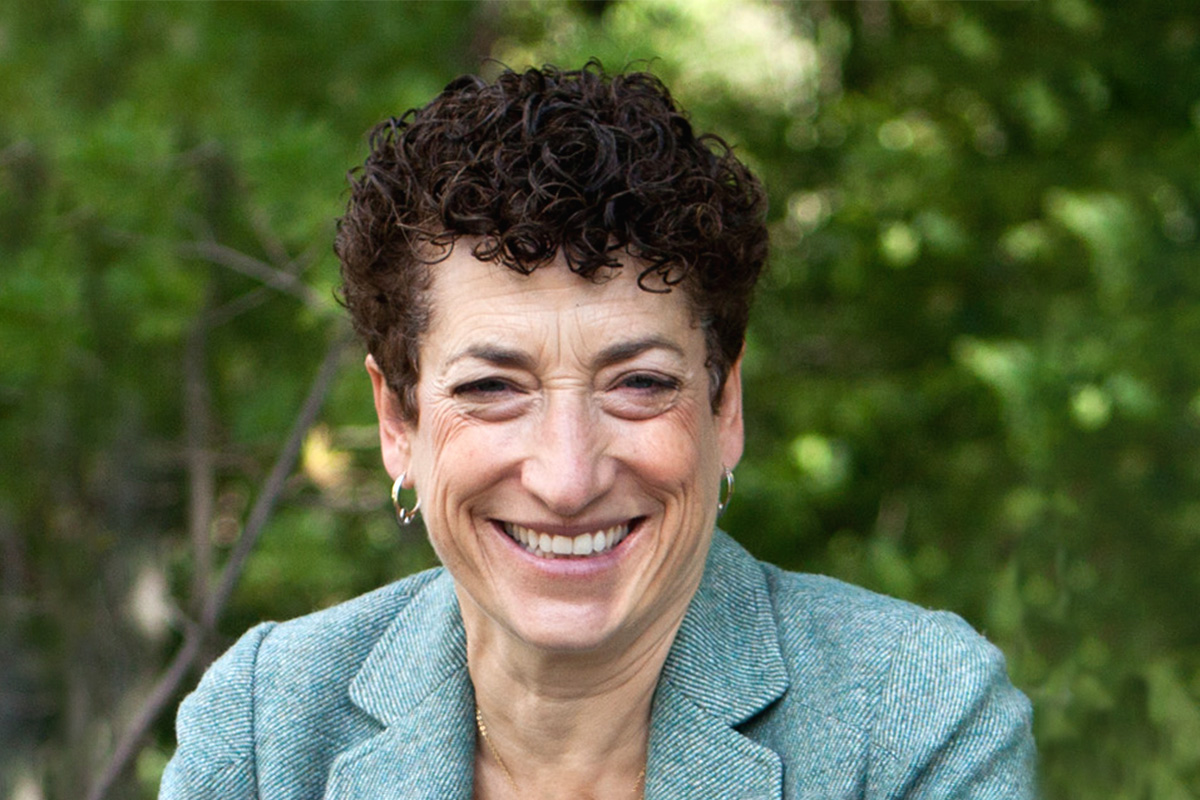
Naomi Oreskes, a leader in examining efforts to undermine the scientific truth on the causes of global warming, will give a Center for Advanced Study MillerComm lecture on how free market ideology is preventing action on climate change.
Photo by Kayana Szymczak
CHAMPAIGN, Ill. - Climate change is a crisis that has resulted from the massive failure of the energy market, and free market ideology and the rejection of government's role in correcting such market failures has stymied efforts to address it, says scientist and historian Naomi Oreskes.
A leader in examining the efforts to undermine the scientific truth about the causes of global warming, Oreskes is a Harvard University professor of the history of science. She will give a Center for Advanced Study MillerComm lecture "How the Myth of the Free Market Has Blocked Climate Action" on Oct. 2 at 4 p.m. at Spurlock Museum of World Cultures. Oreskes is the author of the recently published book "The Big Myth: How American Business Taught Us to Loathe Government and Love the Free Market," and she'll talk about how the myth of the free marketplace has been promoted by industry and how it is preventing the regulation of dangerous practices and products, including fossil fuels.
She came to examine free market ideology through her work on climate change denial in her 2010 book, "Merchants of Doubt," in which she examined how a group of scientists misled the public about the causes of climate change, the dangers of smoking and other issues. The first climate change deniers were scientists who were free market fundamentalists who feared that if government were to play a major role in the marketplace, it would be a step in the direction of Soviet-style communism, Oreskes said.
Such ideological views are based partly on the deep-seated historical suspicion of government that is rooted in our country's origins of rebellion against monarchy. However, business leaders have promoted the theory of a free market to serve their own interests in being unfettered by government regulation, she said.
The new book explores how the idea of a free marketplace was promoted through avenues ranging from Hollywood films to children's books.
"They constructed a story that the free market was built into the foundations of American society. That is false," Oreskes said. "They systematically downplay government programs that work. For example, Social Security is one of the most successful government programs ever. It's never been insolvent, and it's absolutely achieved the goals of eliminating poverty among the elderly."
Oreskes contends that proponents of a free market used the alleged failures of other government programs to discredit government as a whole.
"There's really no such thing as a free market because markets are human institutions, they are as old as time and we have always had rules about how markets should operate," Oreskes said.
Further, the fossil fuel market "is one of the most heavily subsidized industries on the planet," with $10 in subsidies going to the fossil fuel industry for every dollar in renewable energy subsidies, she said.
Oreskes believes that eliminating subsidies for fossil fuels and letting them compete in the marketplace with renewable energies would benefit the climate and allow a much more modest government role in the energy marketplace. Oreskes cautions that she is not advocating for larger government.
"The best solution to any problem is the smallest one that fixes it," she said. "I'm advocating for a realistic view of what markets can do and where we need government involvement."
For example, the opioid crisis was another market failure where the government should have much more strictly regulated the pharmaceuticals. But "right-wing America is loath to admit we need to have more regulations," Oreskes said. "There are clear solutions to help, but conservatives oppose those solutions because they involve more government. They want to leave these things to the private sector."
She said the problem is not only one of conservatives. In her book, she takes former President Bill Clinton to task for deregulating the telecommunications industry, resulting in less competition and higher prices. But the Republican position on climate change is entrenched and denial still dominates, Oreskes said.
"Climate change denial has been a winning strategy for the Republicans since the 1980s," she said. "I keep waiting for a Nixon-goes-to-China moment - that brave Republican who will say, 'We've backed ourselves into a corner and people are being hurt. This is a real issue affecting the American people and we have to find a way to fix it.'"
Eventually, the problem will cause severe damage to the economy, she said.
"My students and I did a modelling exercise last year that showed that if we just continue with business as usual, there's a real chance that economic growth will more or less come to a standstill because the cost of climate change becomes so great, it outruns the global net gross national product. What would that mean to bring the world economy to a halt?" Oreskes said. "If you look at all the damage done just this year by floods, hurricanes and typhoons, it's pushing into the trillions of dollars. Taxpayers will be stuck with the bill."






